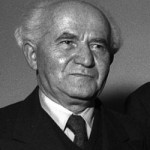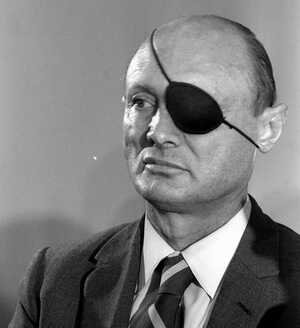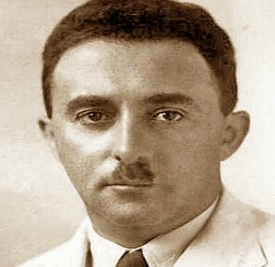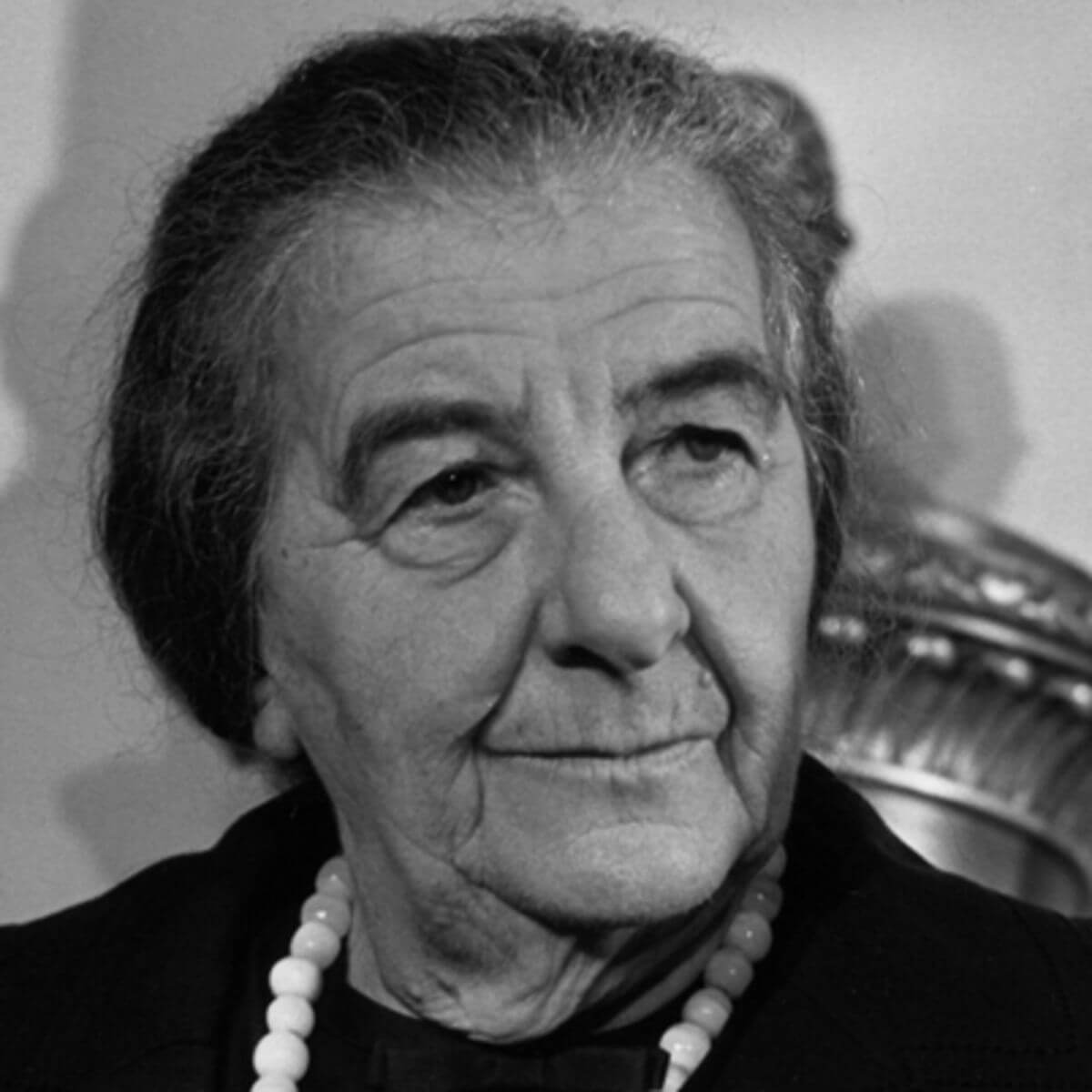See the Hebrew list of documents for links to the original documents and files
- Yitzhak Rabin, Israel Ambassador in Washington, to Moshe Bitan, Deputy Director General for North American and African Affairs in the Foreign Ministry, February 20, 1968
TT-29/11
The first report that Rabin sent to the Foreign Ministry after taking up his post. It begins with a brief review of his first meeting with Secretary of State Dean Rusk. Since he had just arrived, the two avoided entering into an in-depth discussion. He devotes the bulk of the report to comments on the embassy staff, and notes that he has not yet presented his credentials to the president.
- Yitzhak Rabin, Israel Ambassador in Washington, to Aviad (Adi) Yaffe, Head of the Prime Minister’s Bureau, April 3, 1968
P- 4685/7
Rabin describes his initial impressions of the situation in the United States, with emphasis on the issue of the Vietnam War and the negotiations to achieve a diplomatic agreement with North Vietnam. He notes that the fact that President Lyndon Johnson had decided a few days earlier not to run for president in the upcoming elections would weaken Israel’s influence on him, and could prompt the State Department to take action regarding Israel. Israel needs to obtain a “substantial promise” with regard to the purchase of the Phantom aircraft. He concludes with a request to send greetings to Prime Minister Levi Eshkol and his wife Miriam.
Codename “Ilan” – Abraham Fortas
Codename “Issachar” – Lyndon Johnson
- Minutes of a Meeting between Ambassador Yitzhak Rabin and Prime Minister Levi Eshkol, Foreign Minister Abba Eban, and others, Tel Aviv, May 24, 1968
G-16103/7
Prime Minister Eshkol and his advisors, Foreign Minister Abba Eban, senior officials in the Foreign Ministry, the head of the Mossad Meir Amit and Ambassador Rabin discussed changes in the American administration’s approach to Israel. The discussion opened with the question of Israel’s military presence on the Sanafir and Tiran Islands (in the Gulf of Eilat). The main focus was on the pressure the Administration is putting on Israel to negotiate with Egypt. They analyzed the reasons for the new situation and put forward various proposals for how to deal with it. Two days later, on May 26, Rabin presented the matter at a cabinet meeting.
- Yitzhak Rabin, Israel Ambassador in Washington, to Abba Eban, Minister of Foreign Affairs, December 6, 1968
MFA-6721/2
Rabin’s report on his conversation with Joseph (Joe) Sisco, Assistant Secretary of State for Near Eastern and South Asian Affairs, regarding Egypt’s response to the proposal of Secretary of State Rusk. During the meeting, Rabin expresses unequivocal opposition to Egypt’s response. He notes that Egypt may be making exaggerated demands because it felt that the United States was moving closer to its position on the issue of withdrawal to the June 4 borders.
- Yitzhak Rabin, Israel Ambassador in Washington, to Abba Eban, Minister of Foreign Affairs, August 12, 1969
A-7433/5
Rabin reports on a conversation with Sisco, which dealt with the situation in Jordan and the prospect of the collapse of King Hussein’s regime. Rabin presents his personal position, that perhaps if Israel had occupied all of Jordan during the Six-Day War, it would have been possible to avoid the current situation and to resolve the Palestinian issue more easily. The rest of the conversation focuses on talks between the Soviets and the Americans on the conflict in the Middle East. The Soviets are trying to move the talks to forums that will benefit them and allow them to put pressure on Israel and the United States.
- Yitzhak Rabin, Israel Ambassador in Washington, to Moshe Bitan, Deputy Director General for North American and African Affairs in the Foreign Ministry, October 22, 1969
A-7433/5
In an introductory meeting between Rabin and US Deputy Secretary of Defense David Packard, the two discussed Packard’s approach, and that of the Defense Department in general, regarding Israel and its security needs. The conversation focused on the supply of the Phantom aircraft, and it emerged that the Defense Department had its own considerations. Packard noted that they were not subordinate to the State Department, but worked alongside them. Thus it was not enough for the State Department to give the green light to supply the aircraft to Israel. As long as the decision depended on the Defense Department, it would be delayed.
- Yitzhak Rabin, Israel Ambassador to Washington, to Prime Minister Golda Meir, December 29, 1969
A-7071/2
Following Israel’s harsh criticism of the first Rogers Plan, and in an attempt to prevent the same criticism from being directed at the president, Kissinger arranged a brief meeting between Rabin and Nixon. At the meeting, the president expressed understanding and good will towards Israel’s security and economic needs. Rabin was not impressed by this gesture and concluded his report with a recommendation to continue taking a critical line toward the administration.
See more on the preliminary meeting between Rabin and Kissinger that dealt with Israel’s criticism of the Rogers Plan in File A 7071/2, pp. 159-151.
Codename “Caesar” – Henry Kissinger
Codename “Flint” – Richard Nixon
- Yitzhak Rabin, Israel Ambassador in Washington, to Gideon Raphael, Director General of the Ministry of Foreign Affairs, January 2, 1970
MFA-9360/1
Rabin requests that additional staff be assigned to the consulates throughout the United States, due to the severe shortage of manpower. As a temporary solution, he suggests transferring staff to the missions from the Israeli delegation to the United Nations. In addition, he comments on the outdated state of the printing equipment in the embassy and the consulates.
- Yitzhak Rabin, Israel Ambassador in Washington, to Abba Eban, Minister of Foreign Affairs, April 17, 1970
MFA- 9341/4
In view of concern in Israel over the United States’ response to Israel’s deep penetration bombing of Egypt, Rabin tries to clarify the American approach to Israel’s military operations. He explains that the United States wants to avoid a situation that could be seen as a conspiracy with Israel. In addition, the Americans see Israel as an independent state that maintains its own security. Therefore, official approval from the United States for military actions should not be expected. If they really do not want Israel to act, they have ways of conveying the message.
- Yitzhak Rabin, Israel Ambassador in Washington, to Simcha Dinitz, Head of the Prime Minister’s Bureau, September 21, 1970
MFA- 9341/9
Rabin reports on his meeting with Kissinger during the Black September crisis in Jordan. Kissinger asked whether Israel would be prepared for a ground attack on Syria, with the understanding in Israel and the United States that an air strike would probably not be enough. Rabin replied that he would pass the question on to the authorities in Israel. He then presents his own analysis of the complex situation, concluding that the main consideration should be Israel’s own best interests. In order to avoid a conflict with Syria and the Soviet Union, he proposes for the time being to wait and see how the situation develops.
Codename “Cardinal” – Henry Kissinger
- Summary of a conversation between Yitzhak Rabin, Israel Ambassador to Washington, and Joseph Sisco, Assistant Secretary of State for Near Eastern and South Asian Affairs, February 23, 1971
A-4 / 7249
Rabin and Sisco discuss Israel’s readiness for negotiations with Egypt and Israel’s position in its response to Jarring’s proposal of February 8, based on the principle of withdrawal to safe borders, but not to the June 4 lines. Rabin presented the Israeli government’s position, noting that it was consistent with his personal view, based on his experience as IDF chief of staff.
- Yitzhak Rabin, Israel Ambassador to Washington, to Leah Rabin, July 15, 1971
G-12824/10
Alongside updates about their apartment in Israel and finances, Rabin shares his personal philosophy: he believes in standing up independently for his opinions, even if it creates conflict. He understands that this approach will create problems, such as the media reaction to an interview he gave, and apologizes for the fact that Leah and Dalia (his daughter) are suffering as a result. In his view, the Foreign Ministry and Moshe Dayan’s associate were responsible for the attacks on him.
* Copies of this letter, and of other letters from Yitzhak Rabin to his wife, Leah, were given to the Israel State Archives by Leah Rabin’s office, as part of the preparatory work on the commemorative book for Prime Minister Yitzhak Rabin. The comments on the photocopy of this letter, and on additional letters in the file (Documents 16, 21) are editorial comments added as part of the project.
- Abba Eban, Minister of Foreign Affairs, Jerusalem, to Yitzhak Rabin, Israel Ambassador in Washington, July 18, 1971
MFA- 5969/3
Eban defends the need to wage a diplomatic struggle at the UN and claims that Rabin’s position towards this institution “is fuelled by jealousy that is incomprehensible, and by ignorance.” He gives several examples of the importance of Israel’s political struggle at the UN, such as the negotiations over Resolution 242 in 1967. At the end of his remarks, he suggests that he and Rabin consider the discussion on this issue closed.
- Yitzhak Rabin, Israel Ambassador in Washington, to Simcha Dinitz, Head of the Prime Minister’s Bureau, February 15, 1972
A-7052/21
Rabin expresses his anger about the leaks in the Israeli press of conversations between Anatoly Dobrynin, the Soviet ambassador to the United States, and Henry Kissinger. According to him, the leak endangers Israel’s relations with the United States. Rabin claims that the leak probably stems from the Foreign Ministry. He recommends that the number of people exposed to the communication channel concerning Kissinger be severely limited, and in effect demands that the Foreign Minister be excluded from it.
Codename “Cardinal” – Henry Kissinger
- Yitzhak Rabin, Israel Ambassador in Washington, to Simcha Dinitz, Head of the Prime Minister’s Bureau, April 11 1972
A-7061/3
Rabin describes his efforts to encourage Kissinger to prevail on President Nixon to put forward the issue of the Jews of the Soviet Union who are being prevented from leaving due to the policies of the regime. Kissinger made it clear to Rabin that Nixon is not the right person for this. He agreed to Rabin’s proposal to contact John Mitchell, the Attorney General of the United States. Rabin indicates that he will try other avenues of action – Mitchell, activists in the Jewish community, and even Billy Graham Jr., a well-known Baptist minister who has worked on the issue.
Codename “Shaul” – Henry Kissinger
Codename “Robert” – Richard Nixon
Codename “The Preacher” – William (Billy) Graham Jr.
- Yitzhak Rabin, Israel Ambassador in Washington, to Leah Rabin, May 2, 1972
G-12824/10
Rabin shares his hesitations about the future, after the end of his term as ambassador. He notes that Yigal Allon had promised him that he would enter the Knesset and even the government after the elections. However, he is careful not to get his hopes up, as he had been given similar promises in the past that had been disappointed. Rabin is also worried that he may remain without any position for a long period.
* Editorial notes were added to the photocopy of the original document
- Yitzhak Rabin, Israel Ambassador in Washington, to Simcha Dinitz, Head of the Prime Minister’s Bureau, May 7, 1972
A-7249/6
Rabin summarizes a meeting with William (Billy) Franklin Graham, Jr., a Baptist minister with ties to President Nixon, on the subject of the Soviet Jews. Rabin thanked Graham for his work for Israel and emphasized the importance of Jewish emigration from the USSR. Graham promised to raise the subject with the president before his forthcoming meeting with Brezhnev. Rabin recommends to Dinitz that the prime minister gives public expression to her efforts on behalf of the emigration of Romanian Jews.
- Yitzhak Rabin, Israel Ambassador in Washington to Prime Minister Golda Meir, June 3, 1972
A-7249/6, A-8 / 280
Summary of a secret meeting between Rabin and Kissinger. The meeting took place following the Moscow Conference (May 22 – 30, 1972), between the heads of state President Nixon and General Secretary Leonid Brezhnev. Kissinger updates Rabin on the meeting. He gives him a secret document containing principles on which the follow-up talks between the Americans and the Soviets on the Middle East will be based, and asks Rabin for his opinion of them. Rabin and Kissinger see the new document as a positive development, because it effectively replaces the Rogers Plan and does not commit Israel to a full withdrawal to the 1967 lines.
Codename, “Shaul” – Henry Kissinger
Codename, “Robert” – Richard Nixon
Codename, “Terence” – Anatoly Dobrynin
- Yitzhak Rabin, Israel Ambassador in Washington to Mordechai Gazit, Director General of the Foreign Ministry, June 6, 1972
MFA-5297/24
Rabin expresses anger at the way in which his activities and those of the embassy are reported in the weekly reviews of the Research Department at the Foreign Ministry. He claims that there are distortions in the reviews and gives the example of the coverage of the embassy’s reaction to the terrorist attack on Lod airport on May 30, 1972. He asks Gazit to investigate the source of the phenomenon.
- Yitzhak Rabin, Israel Ambassador in Washington to Mordechai Gazit, Director General of the Foreign Ministry, July 26 1972
MFA- 5969/3
In his letter to Gazit Rabin expresses sharp criticism of Israel’s excessive investment of resources in the UN arena, and asks why lessons have not been learned in this regard. He claims that, contrary to attempts by officials in the Foreign Ministry to present the UN as an important international forum, the UN is “a platform for anti-Israeli demagogy,” and Israel is suffering failure after failure there.
- Yitzhak Rabin, Israel Ambassador to Washington, to Leah Rabin, August 9, 1972
G-12824/10
Rabin writes about their family life and his problems with the Foreign Ministry. He shares his feelings towards the end of his posting as ambassador: the difficulty of leaving the position, which is even greater than when he finished his term as chief of staff, his feeling that he had succeeded in the position and the uncertainty about the future that continues to bother him.
* Editorial notes were added to the photocopy of the original document
- Avner Idan, Minister at the Israel Embassy in Washington to Simcha Dinitz, Head of the Prime Minister’s Bureau, September 20, 1972
A-7249/6
Summary of a meeting between Rabin and Kissinger held after the massacre of the Israeli athletes at the Munich Olympics and Israel’s military response in Syria and Lebanon. Rabin tried to explain to Kissinger that the Israeli public had been deeply shocked and that there must be a response to terror. The two discussed political developments with the Soviet Union and Egypt, Egyptian President Anwar Sadat’s decision to expel the Soviet military advisors from Egypt and how to bring about his rapprochement with the United States. In addition, they discussed the ‘ransom’ payment that the Soviet Union had imposed on Jews wishing to emigrate and the pressure from Jewish bodies in the United States on the Administration to act against this policy.
Codename, “Shaul” – Henry Kissinger
Codename, “Robert” – Richard Nixon
Codename, “Tom” – Alexander Haig, the White House Chief of Staff
- Yitzhak Rabin, Israel Ambassador in Washington, to Simcha Dinitz, Head of the Prime Minister’s Bureau, [October 1972]
A-7792/8
In a personal letter, Rabin writes that Abba Eban and his sycophants are trying to exploit the political uncertainty in Israel for their own personal advancement. Rabin also raises the possibility that Eban will block Dinitz’s appointment as the next ambassador. In view of the situation, Rabin recommends that the prime minister visit the United States in December 1972, rather than after the official inauguration of the president in January 1973, in order to coordinate the policy of Israel and the United States for the coming year. Rabin’s reference to the political uncertainty refers to doubts regarding Golda Meir’s re-election as prime minister and the question of who will replace her if she retires. Among those interested in succeeding her was Abba Eban (Dinitz’s reply to Rabin is in File A-7792/8 p. 104)
Codename, “Shaul” – Henry Kissinger
- Yitzhak Rabin, Israel Ambassador in Washington, to Simcha Dinitz, , Head of the Prime Minister’s Bureau, January 25, 1973
A-7061/6
Summary of a meeting between Rabin and President Nixon towards the end of Rabin’s term in Washington. Nixon, who initiated the meeting, expresses his appreciation to Rabin for his performance, and Rabin, for his part, congratulates him on his impressive victory in the elections. During the meeting, they also spoke at length about Israel’s security and political situation, and in particular about the possibility of Egypt violating the ceasefire, the prospects for an agreement, and the various options for its future. Nixon noted that in the absence of progress toward a political solution, he had no ideas how to maintain stability in the Middle East, and suggested that Rabin, upon his return to Israel, go to the Golan Heights and look for them. Rabin spoke in general about the political outlook, and Nixon expanded the discussion to include his own views on the philosophical idea of ’peace’
Codename, “Shaul” – Henry Kissinger
Codename, “Robert” – Richard Nixon
- Report by Yitzhak Rabin, Israel Ambassador to Washington, on his meeting with Henry Kissinger, the National Security Advisor, February 28, 1973
A-7062/8
The main purpose of the conversation was to summarize the issues that would be raised in the prime minister’s meeting with President Nixon the next day and to ensure its success. Rabin presented Kissinger with a message from Golda Meir: Israel would not oppose continued talks between the United States and the Soviet Union, but would request that the Americans coordinate their position with Israel on any issue that had implications for it. Israel’s consent was conditional on continued supply of the planes and approval for manufacture of an Israeli plane based on American know-how. Later in the conversation, Rabin sharply criticized the United States’ decision to condemn Israel’s downing of a civilian Libyan plane precisely during the prime minister’s visit to the United States, which could lead her to return to Israel.
Codename, “Shaul” – Henry Kissinger
Codename, “Robert” – Richard Nixon




